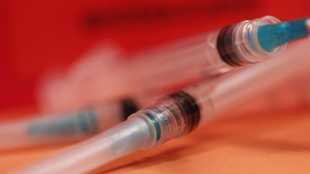 CDC, DEBORA CARTAGENAAn experimental Ebola vaccine generated a strong immune response that protected four monkeys from lethal doses of the virus, according to results reported this week (September 7) in Nature Medicine. Researchers at the US National Institutes of Health (NIH) have now initiated clinical trials involving 20 human participants; the earliest results are expected by the end of the year.
CDC, DEBORA CARTAGENAAn experimental Ebola vaccine generated a strong immune response that protected four monkeys from lethal doses of the virus, according to results reported this week (September 7) in Nature Medicine. Researchers at the US National Institutes of Health (NIH) have now initiated clinical trials involving 20 human participants; the earliest results are expected by the end of the year.
Nancy Sullivan of the US National Institute of Allergy and Infectious Diseases (NIAID) and her coauthors created the vaccine by adding two genes from the Ebola virus to a chimpanzee cold virus; when injected into macaques, it protected the animals from an Ebola infection that was lethal to unvaccinated animals within six days. Although the immunity waned after 10 months of the initial vaccine dose, a booster shot of a different vaccine—Ebola gene segments carried by a different vector—resulted in longer-term protection.
“There is an urgent need for a protective Ebola vaccine,” NIAID director Anthony Fauci told NPR’s The Two-Way. “It is important to establish that a vaccine is safe and spurs the immune system to react in a way necessary to protect against infection.”
...



















